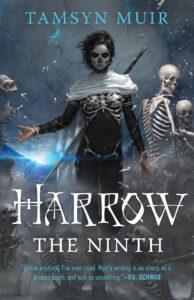Harrowhark Nonagesimus, generally and more pronounceably known as Harrow the Ninth, is one weird chickadee. Even among advanced necromancers, a company not generally known for bland probity, Harrow stands out. Readers of this book’s predecessor, Gideon the Ninth, know it; anyone wandering in on this book as the starting point in the Locked Tomb series (not advisable, by the way) realizes it within just a few pages. More importantly, Harrow herself is only too aware that she is several curves around the bend.
Given her background, it would be a surprise if she were remotely sane. Two hundred children — essentially all the children who remained in the Ninth House at the time — were sacrificed to give Harrow life and necromantic abilities. For the last several years before the book begins, which is to say nearly all of Harrow’s teenage years, she has propped up her undead parents, keeping them going through the priestly motions for the Ninth House when they should be permanently horizontal. The early chapters of Harrow the Ninth also seem to reveal that she entered the Locked Tomb and fell in love with what she found there. Harrow is a most unreliable narrator, so I would not put it past Tamsyn Muir to reveal that those events were not as Harrow perceives them initially, but at the point I have reached I have to consider it another contribution to Harrow’s harrowing.
The book switches from second-person narration in the story’s present to third-person for filling in Harrow’s past. The third-person sections raise more questions than they have answered so far because they are very different from what readers (it’s worth saying again that Harrow the Ninth is not a good starting point) saw in Gideon the Ninth. For one thing, there’s no Gideon. The Ninth House’s cavalier, a counterpoint to Harrow as its necromancer, is a poetic young man improbably known as Ortus Nigenad. “Gideon” is hiding in that name, but what to make of the remaining r-t-u-s-n-a?
And the fact is, I miss Gideon. I miss her glee, I miss her act-first-think-later-if-at-all approach, I miss her irreverence. At least so far, Harrow’s seriousness is no substitute. I don’t really believe that Gideon never happened, as the narration in Harrow the Ninth implies, but I am cross enough even at the implication that I am in no great hurry to find out what *did* happen. Since beginning Harrow the Ninth in the first third of October, I have started four other books and finished two of them. I’ll probably also finish Invisible Cities soon, too.
Going by Doreen’s review, I haven’t really begun the main plot of Harrow yet, a bit more than a quarter of the way in. Harrow has become a Lyctor, but she is far from having the full measure of what that means. She is in the Emperor’s company, and there are hints and intimations, but it is still mostly set-up. Will Harrow the Ninth turn into a different kind of book the way Gideon the Ninth did? Very probably.
It may just be a while before I come along and find out. I know where Harrow will fit in my Hugo voting, and I still aim to read the novelettes and the novellas before the rapidly approaching deadline arrives. Maybe then I’ll go back and see what happens to Harrow.


4 comments
Skip to comment form
*cough* Saturn*cough* ;).
Author
Oh duh. I have no brain and I must write.
Keep reading, please! I was so confused at first too, wondering where the hell Gideon was, but then it turned out to be one hell of a ride.
Author
Glad to hear it!